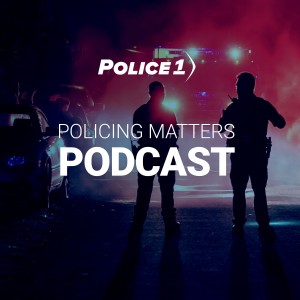
Talking the beat to cover what matters to you as an LEO. Join deputy chief Jim Dudley (ret.) every weekly as he sits down with law enforcement leaders and criminal justice experts to discuss strategy, challenges and trends in policing.
Talking the beat to cover what matters to you as an LEO. Join deputy chief Jim Dudley (ret.) every weekly as he sits down with law enforcement leaders and criminal justice experts to discuss strategy, challenges and trends in policing.
Episodes

Friday Nov 15, 2019
Cops and sleep: How agencies can help mitigate the fatigue factor
Friday Nov 15, 2019
Friday Nov 15, 2019
According to a 2011 study by the Automobile Association of America, 53 percent of police officers get less than 6.5 hours of sleep daily (compared to 30 percent of the general population), 91 percent report routinely feeling fatigued, 14 percent are tired when they start their work shift, and 39 percent admit to having fallen asleep at the wheel. In this podcast segment, Jim and Doug discuss the matter of police officer sleep and how it affects effectiveness on the job.

Friday Nov 08, 2019
Putting police in the political cross hairs
Friday Nov 08, 2019
Friday Nov 08, 2019
Former presidential candidate Beto O'Rourke famously said during a recent debate that he'd gladly enforce a mandatory gun buy-back program that would target legally purchased "assault rifles" such as AR-15s and AK-47s. Disregarding the discussion about the Constitutionality of such a proposal, his suggestion highlights how politicians have a tendency to put police in the middle of political issues without knowing all the details of an issue. In this podcast segment, Jim and Doug discuss how O'Rourke's suggestion would put police officers in danger, how it doesn't really address the matter of gun violence in America, and how it shines a light on how police are too often put in the middle of a political debate.

Friday Nov 01, 2019
Policing large-scale events: Long guns for foot patrol?
Friday Nov 01, 2019
Friday Nov 01, 2019
Following the active shooter event at the Gilroy Garlic Festival in California, one police agency in the Golden State has decided that during large-scale events in its jurisdiction, a certain number of uniformed personnel will be "strapped" with patrol rifles. The San Joaquin County Sheriff's Office announced in mid-August that an undisclosed percentage of officers patrolling festivals and other events will be carrying AR-15 rifles capable of responding to an attacker with a long gun. In this podcast segment, Jim and Doug discuss the balancing act between protecting life and presenting a non-threatening image.

Thursday Oct 24, 2019
Policing on Halloween: Replica weapons, crowd control, and child safety
Thursday Oct 24, 2019
Thursday Oct 24, 2019
Policing on Halloween is different from any other day of the year. Children who are ordinarily on their living room couch after supper are out on the streets. Adults consuming large quantities of alcohol wander from one bar to another carrying costume "props" resembling edged weapons and firearms. Teenagers get into all manner of mayhem. In this podcast segment, Jim and Doug discuss the various challenges facing police officers on the final night of October.

Friday Oct 18, 2019
How police and emergency medical response mesh at critical incidents
Friday Oct 18, 2019
Friday Oct 18, 2019
Do police, fire, and EMS share the same priorities and communication during the response to critical and mass casualty incidents? How can all of the first responders address their individualized priorities while sharing the same goals? Do current policies adequately address the need during urgent times when wounded and bleeding victims remain in a hot or warm zone of a critical incident? In this podcast segment, Jim Dudley is joined by veteran EMS leader Rob Lawrence for a discussion on dilemmas, response and the preparation required before the critical incident occurs.

Friday Oct 11, 2019
Why the media shouldn‘t name mass killers
Friday Oct 11, 2019
Friday Oct 11, 2019
Two high-profile active shooter incidents in the span of two days in early August—one in Dayton, Ohio and the other in El Paso Texas—has reignited discussions about the threat of individuals conducting mass murder. Later in August, police in Connecticut, Florida, and Ohio arrested three men in the span of two days, potentially preventing three separate but unrelated mass shooting plots. One of the things that is common following events such as these is the deep-dive examination by the national mainstream media into the backgrounds of the perpetrators. But what is the benefit of this type of investigation? Some say that reporting on every detail of an individual's life leading up to an attack or an attempted attack glorifies the individual, and puts the victims in the background. In this podcast segment, Jim and Doug discuss the "Don't Name Them" effort, which encourages media outlets to minimize coverage of the assailant and focus more on the victims.

Thursday Oct 03, 2019
The evolution of crime prevention through environmental design
Thursday Oct 03, 2019
Thursday Oct 03, 2019
Well-lit areas have less crime than areas that are enshrouded in darkness at night. Properties with waist-high fencing at the front of the dwelling and shoulder-height fencing on the B, C, and D sides tend to be less prone to break-ins. Structural elements that prevent access and egress to open areas help prevent criminal activity. Crime prevention through environmental design (CPTED) is not a new concept—it dates back to the 1960s—but it is ever evolving. In this podcast segment, Jim and Doug discuss the latest trends.

Friday Sep 27, 2019
Should cops be allowed to use CBD oils for pain relief?
Friday Sep 27, 2019
Friday Sep 27, 2019
There are now 33 states (as well as the District of Columbia) that allow the sale and use of medical marijuana products. Among the myriad options available are topical CBD oils that are intended to relieve muscle pain, among other things. These products do not contain the psychoactive THC element of the plant that causes a "high" and proponents say that these oils are safer and more effective than many over the counter and prescription pain medications. In this podcast segment, Jim and Doug discuss whether or not police officers should be allowed to use these products.

Friday Sep 20, 2019
Cops and social media‘s ‘closed‘ groups
Friday Sep 20, 2019
Friday Sep 20, 2019
A recent series of articles published by a California organization called The Center for Investigative Reporting—a nonprofit founded in the late 1970s—alleged that a significant number of American police officers were members of "closed" groups on social media that have racist, sexist, or other extremist ideologies. The articles seemed to indicate that a large number of officers belong to groups on social media hosted by Oath Keepers, Three Percenters and other organizations. In this podcast segment, Jim and Doug discuss these groups as well as officers' participation in them.

Thursday Sep 12, 2019
California‘s AB 392 and police use-of-force policies
Thursday Sep 12, 2019
Thursday Sep 12, 2019
Recently, Governor Gavin Newsom signed AB 392. Media reaction would indicate that the bill would drastically reduce police use of force, but the reality is that the new language does little to restrict officers from using force when they reasonably believe that there exists an imminent threat of death or serious bodily injury to the officer or to another person, or to apprehend a fleeing person for any felony that threatened or resulted in death or serious bodily injury. Still, the law does contain some language that might cause officers to hesitate to use force, potentially putting them in danger. Some opponents to the law are calling it a watershed event that could negatively affect policing in the United States. In this podcast segment, Jim and Doug discuss the law and its potential result on police use of force.
